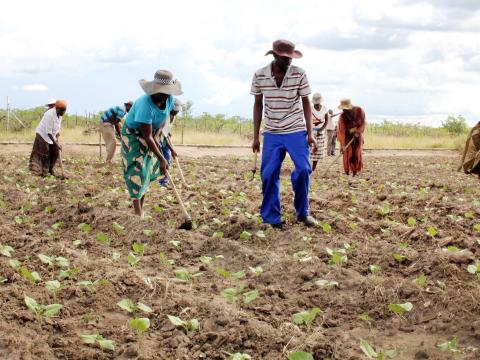Supporting small holder farmers in Zimbabwe

In Bubi District, Hauke irrigation scheme was completed in 2012. The community engaged WV to build on the work originally initiated by the European Commission and the Government of Zimbabwe, to complete the irrigation of the land and the building of canals. In the most recent cycle (July-December, 2012),150 workers including 66 plot holders were involved in the 4 months of labour for site clearing, stumping and canal rehabilitation.
Upon participating in the project, farmers organised themselves into a cooperative with a constitution and meetings every month. They purchase agricultural inputs together, share a tractor, and put away some of the harvest for the orphans and elderly in need. They also work for opportunities to sell their produce as a group to receive better value. of the land and the building of canals. In the most recent cycle (July-December, 2012),150 workers including 66 plot holders were involved in the 4 months of labour for site clearing, stumping and canal rehabilitation.
The farmers used to depend on rain before they built the irrigation canals, which only allowed them one crop cycle per year. With the irrigation canals in place, they can now do 3 cycles per year, rotating different kinds of crops. This has led to increased production and a more diverse range of food crops for the community. In 2013, the farmers planted maize during January to May and harvested 250kgs each. They then planted maize again in July, as the community still did not have enough staple crops for their yearly consumption. After they harvested in November, some of the farmers were able to sell excess to the neighbouring communities who also lacked daily food, realising some income. Now they no longer receive food assistance and have enough cereal for the year, the farmers are planning to plant sugar beans in February to sell it to clinics and schools nearby. “After that, we will plant frost-resistant crops, perhaps cabbage, now that the cold season is approaching,” the lead farmer explained. “We now have access to diversified food crops that nourish our bodies. The cash from sales is used to pay for our children’s school fees and cover other financial needs.” David Khabo, one of plot-holders in the scheme, smiles.
50% of the world’s hungry are smallholder farmers. 80% of the developing world’s food is a product of a small farm (FAO, 2013).
A few hours drive from Bubi, Dhlamini is another small community benefiting from the project, located in Tsholotsho District in Matabeleland North. The majority of community members are widowed women and children. Here, WV, in close collaboration with the Zimbabwe Government’s Agricultural Extension Service (a.k.a. Agritex), supported farmers to cultivate drought resistant pearl millets using Conservation Farming (CF) methods.
The farmers were organized into groups of 8 members and were provided tools and technical training. Food assistance provided by the project carried the farmers through the lean season to sustain their work. Even after the food distribution stopped in Dec. 2013,the farmers continued working with CF, as they could clearly see the benefits. Previously, the farmers were forced to harvest and consume their produce even before than crops were mature, not leaving anything for the lean season or as seed reserve. They used to have only one meal a day. Now, they produce enough to have 2-3 meals a day regularly, and can reserve some harvest for the next cycle.
“The project helped us to be united, working as a group. Others come and join us to learn from our success,” Savy Ntutha (58, widowed, supporting 9 children, lady on the left in the photo) mentioned. She recalled how tough it was to pay the school fees before. She used to do odd jobs at school for the missed fees, leaving young children alone at home. When the food was short despite her best efforts, she went begging, lacking an alternative. “CF helped us get high yields. We saw increased yield per hectare. My children are happy now that they can go to school!” she exclaimed. She can now spend time tending the children, working at her farm and gardens. Edith Ncube (63, widowed, supporting 8 children, lady on the right in the photo) was not a project participant, but she learned from Savy, her sisterin-law. “We are taking a break from hand-outs for once!” Edith proudly declared. “I used to receive assistance from social services.” She smiled at the Social Service worker who joined in the visit. “Thank you, but now I can kiss you good-bye.”
(Visited in March 2014)